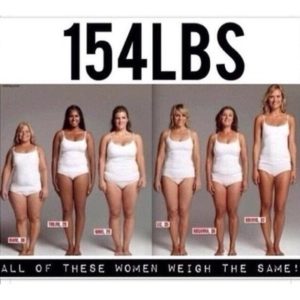The truth is, I don’t know. It’s not always as easy as entering a bunch of numbers into an equation. This isn’t saying it can’t be done. Just more of a reminder that it may take a little time or some trial and error. There are a lot of factors that can and in some cases need to be taken into considered!
Sure, there are lots of free macro/calorie counters online but if you’ve tried any, you’ll realize you rarely ever get the same answer. This isn’t to say they can’t provide you a starting point. However, taking what you get as the one true answer, won’t always get you your desired results.
For instance, the women in the image below are all the same weight. Despite this common factor, they are different ages, heights and eat, work and train differently than one another. This is another reason you can’t use someone else’s macro’s even if you’re the same weight or height.
It is completely possible that two people who are the same height, age and weight will need very different calories. People often forget that our daily actions and eating patterns have a big impact on what our bodies need.
Several months ago I took on two female clients. They are both 30 years old and 5″5. However, after a couple long chats, some hard work and a little trial and error we figured out their maintenance calories. Their calorie intake to maintain their weight was very different. This is why cookie cutter approaches do not work (for everyone)!
Client A eats 3 big meals a day but never snacks
Client A is constantly moving (she’s a big fidget-er).
Client A walks to work.
Client A has a very physical job.
Client A never drinks
Client A loves to train for marathons.
Client A needs ~2100 calories to maintain her weight.
Client B eats 3 small meals and 2 snacks a day.
Client B has a very stressful job.
Client B walks to work.
Client B has a desk job.
Client B drinks once a week.
Client B weight trains 3x a week.
Client B needs ~1600 calories to maintain her weight.
The differences in genetics, calorie intake, each individuals NEAT (non-exercise activity thermogenesis), training preferences, energy output, stress levels, hormones and overall health all have an impact on how much you need to eat.
So, if you’ve calculated your calories or macros, have stuck to them religiously and are still not losing weight, you may actually need less calories than you calculated. We generally like to boost our egos and think we actually work harder and are more active than we truly are. This is why some people actually benefit from under estimating their activity level, especially if they aren’t very consistent about their training.
This is also why I’ve found reviewing people’s food diary prior to calculating their calories/macros to be more beneficial. Sometimes people calculate their macros and think perfect, I’ll eat 1700 calories. However if they took the time to track prior to calculating them they’d realize they’re currently eating way above 1700 or below 1700. Knowing this is helpful because if you are in fact eating 2200 calories a day, you may only need to reduce your calories to 2000 to start seeing change. However, if you are actually eating less than 1700 calories you may need to actually start a little lower than 1700. Or, you may need be more diligent in your tracking and make sure you aren’t forgetting about all the “bites, tastes and licks” throughout the day or going overboard with your “cheat meals” or “cheat days”.
If you’re interested in one on one nutritional coaching or having your macros calculated, email me here.


